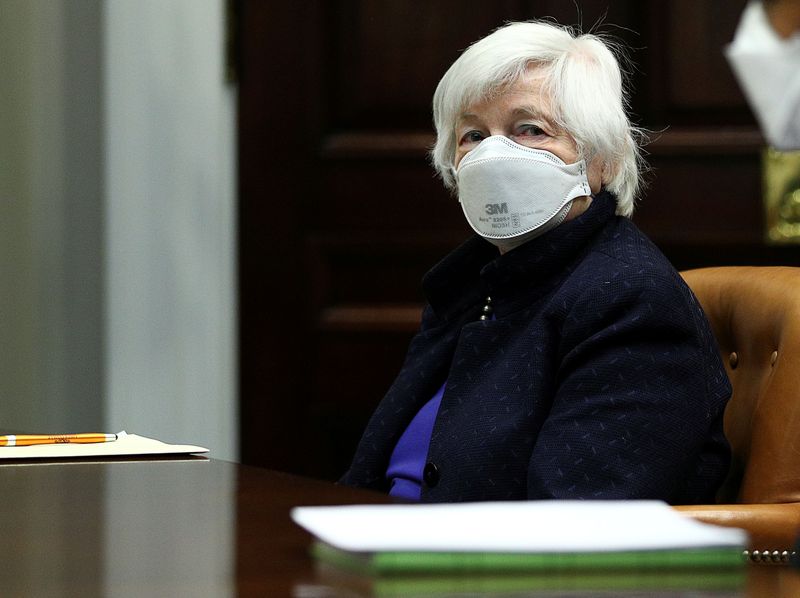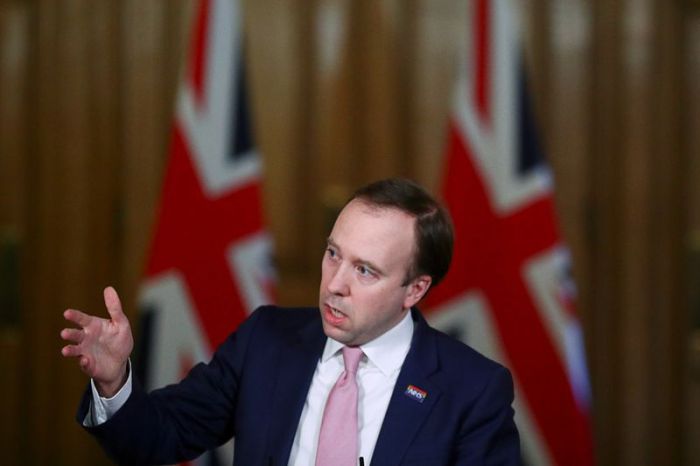WASHINGTON (Reuters) -U.S. Treasury Secretary Janet Yellen on Thursday warned of the risk of a permanent divergence in the global economy in the wake of the COVID-19 crisis, and urged major economies to inject significant new fiscal support to secure a robust recovery.
In a statement to the steering committees of the International Monetary Fund and the World Bank, Yellen underscored the need for major economies to continue supporting developing countries as they grapple with the COVID-19 pandemic, climate change and high debt burdens.
She urged the World Bank to help countries, particularly the world’s poorest, get timely access to COVID-19 vaccines, and backed accelerated negotiation to replenish the World Bank’s International Development Association fund for the poorest countries – a goal the bank aims to reach by December.
The United States had pledged $4 billion to the COVAX global vaccine distribution initiative, Yellen said, urging others to join in. She said Washington, which so far has only loaned vaccines to Mexico and Canada, was exploring sharing excess doses, but gave no details.
Yellen’s comments reflect the Biden administration’s focus on strong international cooperation to tackle global challenges – a sharp departure from the “go-it-alone” approach pursued by former President Donald Trump’s administration.
“The (COVID-19) crisis has exacerbated the trend of rising income inequality, raising concerns about a divergent path within and across countries. We also face the existential threat of climate change. We can only resolve these problems through strong international cooperation,” Yellen said in remarks prepared for her first meeting with the IMF’s International Monetary and Financial Committee and the World Bank’s Development Committee.
The former Federal Reserve chair said substantial fiscal and monetary support from major economies had improved the global economic outlook significantly, but more efforts were needed.
IMF Managing Director Kristalina Georgieva told reporters she was encouraged that the United States and China – the world’s two largest economies – shared a consistent view about their recovery prospects, and their “recognition of the responsibility they have for positive spillover impacts.”
“Like the passengers on a plane, on which we are all passengers, it is important that they work in synch. Then we can fly faster and we can get further,” Georgieva said.
She said IMF members also heard that the Fed was committed to communicate well in advance of any faster return to normalized monetary policy – a change the IMF has warned could have unintended consequences for emerging market capital flows.
Yellen said Washington was implementing a $1.9 trillion COVID-19 relief plan and working on another large infrastructure package, urging other major economies to take similar actions.
“The job is not yet done, given high uncertainty and the risk of permanent scarring,” she said. “I urge major economies to … strive to provide significant amounts of new fiscal support to secure a robust recovery.”
Yellen said developing countries should work with the IMF and World Bank on structural reforms and seek full-fledged IMF financing programs, which carry conditions, where necessary. Some countries may need deeper debt treatment, she added.
She called on all creditors to “fully and transparently” implement the Group of 20’s new debt treatment framework and avoid “unnecessary delays that can prolong debt overhangs and exacerbate growth shocks.”
She also urged the World Bank to lead on “transformative climate investments” and to continue to set an aggressive agenda on climate and the green recovery from the crisis.
(Reporting by Andrea Shalal and David Lawder; Editing by Toby Chopra and Paul Simao)






















